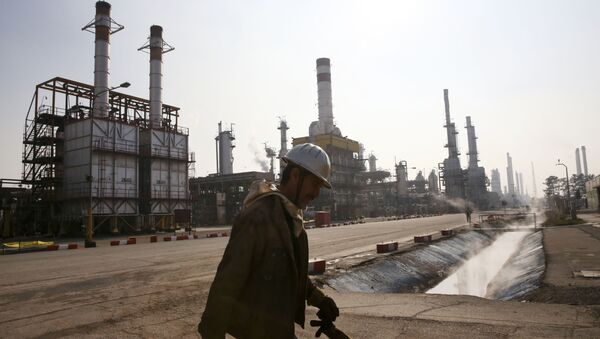MOSCOW (Sputnik), Alexander Mosesov — The idea of oil output freeze was initially brought up in February, with the energy ministers of Saudi Arabia, Qatar, Venezuela and Russia addressing the oil market situation in Doha and agreeing to freeze oil production at January levels if other countries followed suit, in a bid to keep the oil prices from falling further.
On Sunday, the participants of the negotiations of the world's major oil-producing countries, which included both Organization of the Petroleum Exporting Countries (OPEC) members and non-cartel producers, failed to reach an agreement on freezing production levels, with Saudi Arabia insisting on fellow OPEC member Iran’s inclusion in the deal.
Iran vs. Everyone Else
"The market should have never had any confidence in an agreement to freeze production or that the agreement would have an effect on the market. The Iranians could have affected the market but they have been consistently loud and clear that they would not be party to it," Adam Perdue, an economist with the UH Bauer Institute for Regional Forecasting, told Sputnik.
Trends Research Institute head Gerald Celente also noted that "from the onset, Iran stated clearly that it would ramp up production following the lifting of Western sanctions," adding that Tehran did not send a single representative to the Doha meeting.
"In Doha yesterday the weight of politics was more important than common interests of some of the main players of the oil industry. By politics I mean the tensions between Saudi Arabia and Iran… After years of sanctions Iran wants to increase its oil production and exports and will never accept a freeze at this stage. And Saudi Arabia does not want to freeze its production if Iran is not a party to this initiative," Francis Perrin, the chairman of the French-based Energy Strategies and Policies (SPE) firm, told Sputnik.
Iran has been boosting its oil sales after a July 2015 deal with the P5+1 group of world powers, comprising Russia, the United States, China, France and the United Kingdom plus Germany, on monitoring and limiting Tehran's nuclear program in exchange for the easing of international sanctions.
Lack of Spare Capacity
The slump has been driven by the ongoing glut in oil supply, with production standing at record levels. The total output by the OPEC member states amounted to 32.182 million barrels per day in December, over half a million in excess of its 31.5-million barrel production ceiling set on December 4. Output increased to 32.3 million barrels per day in January, according to the organization.
"The putative agreement meant nothing. Outside of Iran, major oil producers do not seem to have much excess capacity to increase production in significant amounts. Therefore a freeze agreement would have just been an agreement to not do what they couldn't do [raise production]," Perdue said.
According to Perdue, as Iran consistently and strongly rejected all thoughts of a freeze on their production, "in sum, the agreement would have been an agreement to do nothing different and was always obviously going to fail."
Not Doha but Supply and Demand
"To us it’s more of a supply-and-demand issue rather than an agreement to freeze production. Hypothetically, in the event that oil prices dramatically dropped and there was an oil freeze agreement arranged out of desperation, the effect on the oil market, for the reasons stated above, would be temporary," Trends Research Institute's Celente said.
SPE Chairman Perrin noted that the good news for producers was that "the oil price fall is rebalancing the oil market with a little more demand and a little less supply from non-OPEC countries in 2016."
Perdue also noted that the only thing that would get the market to balance over time was the supply and demand issue.
"The fall in supply from free-market producers (primarily North American Shale) and demand growth over time will be what gets the market to balance if anything," Perdue said.
The failure in Doha triggered a sharp drop of about 4 percent in oil prices. However, there was a significant rebound afterwards with Brent crude oil trading above $44 per barrel on Tuesday.
"While it will put downward pressure on oil prices, possibly pushing them back to their recent lows, we still maintain our forecast that in the absence of strong global economic growth, crude will fluctuate between the high $20's to mid $40-range," Celente said commenting on the impact of the failure in Doha on the oil market.
The global prices on oil plunged from $115 to less than $30 per barrel between June 2014 and January 2016, hitting their lowest levels since 2003 amid the ongoing glut in global oil supply.


